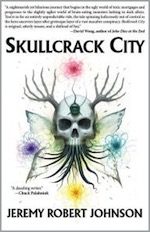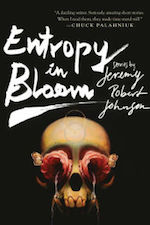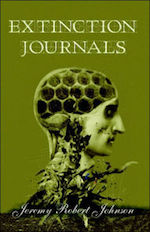On a trip to Portland, Oregon a few years ago, a writer friend of mine recommended that I check out the work of Jeremy Robert Johnson. I dutifully went to Powell’s a day or so later and headed home after having purchased a short novel called Extinction Journals. That book proved to be my introduction to Johnson’s surreal, visceral, and frequently unsettling body of work. One more descriptor, while we’re at it: highly entertaining. Whether he’s writing about bizarre body modification, demonic forces seeking to corrupt the souls of those they encounter, or strange methods of surviving life in a post-apocalyptic wasteland, Johnson brings a pulpy urgency to the page, which blends neatly with the frequently heady concepts that he utilizes in his fiction.
Extinction Journals reads like J.G. Ballard in his 60s-apocalyptic mode (think The Drowned World), spiked with a heady dose of hallucinogens and an irreverent attitude. It’s set after nuclear weapons have devastated the landscape. Its everyman protagonist, Dean, has managed to escape annihilation via a suit that incorporates a legion of cockroaches. (The President attempts a similar trick, albeit with a suit coated in Twinkies. It’s an approach which doesn’t work out quite as well for him.) There’s a surreal logic at work here, and it’s one that carries through as the plot becomes more contorted, involving a character who loses an arm to one set of ants and has it rebuilt by another. Strange body modifications become more prevalent as this short novel heads towards its climax, creating a sense of visceral unease and paving the way for further exploration of this theme in works to come.
 Johnson’s 2015 novel Skullcrack City was set in a near-future world in which extensive body modification is a ticket to celebrity status, and corporate malfeasance has been taken up several notches. Here, too, Johnson blends the familiar and the absurd. Its central character opens the book mired in frustration with his nine-to-five job–something that many readers can relate to–but many of them won’t run afoul of sinister figures, strange medical experiments, and bizarre collective consciousnesses.
Johnson’s 2015 novel Skullcrack City was set in a near-future world in which extensive body modification is a ticket to celebrity status, and corporate malfeasance has been taken up several notches. Here, too, Johnson blends the familiar and the absurd. Its central character opens the book mired in frustration with his nine-to-five job–something that many readers can relate to–but many of them won’t run afoul of sinister figures, strange medical experiments, and bizarre collective consciousnesses.
His latest book, the collection Entropy in Bloom, brings together short fiction from a number of anthologies and earlier collections. (It also includes stories that share characters with Extinction Journals and Skullcrack City.) And it’s a fine primer to his work, which encompasses everything from stories of pernicious terrors working their way into the world to taut crime fiction to insightful character studies. Many of Johnson’s stories focus on placing a protagonist into a situation that they’re wholly unable to deal with, whether navigating a complex relationship with a loved one or grappling with supernatural forces that defy conventional comprehension.
 The story “When Susurrus Stirs” is one of several in this book in which someone finds themselves in a symbiotic relationship with an inhuman intelligence. (It’s also worth mentioning that said story is the most unsettling tale of body horror I’ve read since Karen Russell’s “Reeling For the Empire.”) It begins with the narrator recounting the benefits of this symbiosis: “I’ve been cultivating him, making him more a part of me.” As is often the case with stories in which bodies are altered via something parasitic, this congenial relationship heads into a very different direction by its ending.
The story “When Susurrus Stirs” is one of several in this book in which someone finds themselves in a symbiotic relationship with an inhuman intelligence. (It’s also worth mentioning that said story is the most unsettling tale of body horror I’ve read since Karen Russell’s “Reeling For the Empire.”) It begins with the narrator recounting the benefits of this symbiosis: “I’ve been cultivating him, making him more a part of me.” As is often the case with stories in which bodies are altered via something parasitic, this congenial relationship heads into a very different direction by its ending.
Entropy in Bloom covers over a decade of Johnson’s work (the earliest entries were published in 2004), and between his notes in the back and the stories themselves, readers can piece together his evolution as a writer, embracing an increased ambiguity and a willingness to head to more unsettling places. It’s telling that–to my mind–the strongest story in here is the most recent, a novella called “The Sleep of Judges.” It begins with a realistic situation: a family arrives home and discovers that their house has been broken into; several of their possessions have gone missing. But soon, discontinuities emerge. Roger, the story’s protagonist, sees and hears things that seem uncanny and out of line with a typical burglary. The police officer who shows up on the scene has a habit of saying things that don’t entirely sound right, either. As Roger becomes more isolated, and more obsessed with fortifying his home, the question hangs over the proceedings: is he descending into paranoia, or is something much more sinister at work?
 “The Sleep of Judges” also memorably makes use of an interesting morality–it is in part about how the desire of some men to, essentially, adopt the veneer of an archaic and outdated form of masculinity is a stop on the road to greater horror. This is accentuated by having a character who is described as resembling an “old-timey cowboy” attempt to warn Roger away from such behavior–a genuine article of an older generation who recognizes that Roger’s posturing is, in fact, a terrible idea.
“The Sleep of Judges” also memorably makes use of an interesting morality–it is in part about how the desire of some men to, essentially, adopt the veneer of an archaic and outdated form of masculinity is a stop on the road to greater horror. This is accentuated by having a character who is described as resembling an “old-timey cowboy” attempt to warn Roger away from such behavior–a genuine article of an older generation who recognizes that Roger’s posturing is, in fact, a terrible idea.
It’s also a subtle development of a motif that occurs earlier in the collection: that of a character who turns out to be much less virtuous than they believe themselves to be. (The story “A Flood of Harriers” heads into similar territory, albeit not as effectively, as it tells the tale of an ostensibly “woke” narrator who reveals himself to be significantly more risible.) And while Johnson isn’t necessarily heading into “but who, in this situation, is the real monster” territory—he’s much too good at creating memorably inhuman figures with malice or chaotic indifference on their mind–his flawed humans are also memorable, and capable of inflicting plenty of damage without supernatural help.
In his introduction to the collection, Brian Evenson notes that “once [Johnson] takes on a premise, no matter how absurd it is to begin with, he treats it seriously.” And perhaps that’s another lesson that can be learned from Johnson’s fiction: though you might not expect it, the absurd can produce vivid and shocking horror all its own.
 Tobias Carroll is the managing editor of Vol.1 Brooklyn. He is the author of the short story collection Transitory (Civil Coping Mechanisms) and the novel Reel (Rare Bird Books).
Tobias Carroll is the managing editor of Vol.1 Brooklyn. He is the author of the short story collection Transitory (Civil Coping Mechanisms) and the novel Reel (Rare Bird Books).










